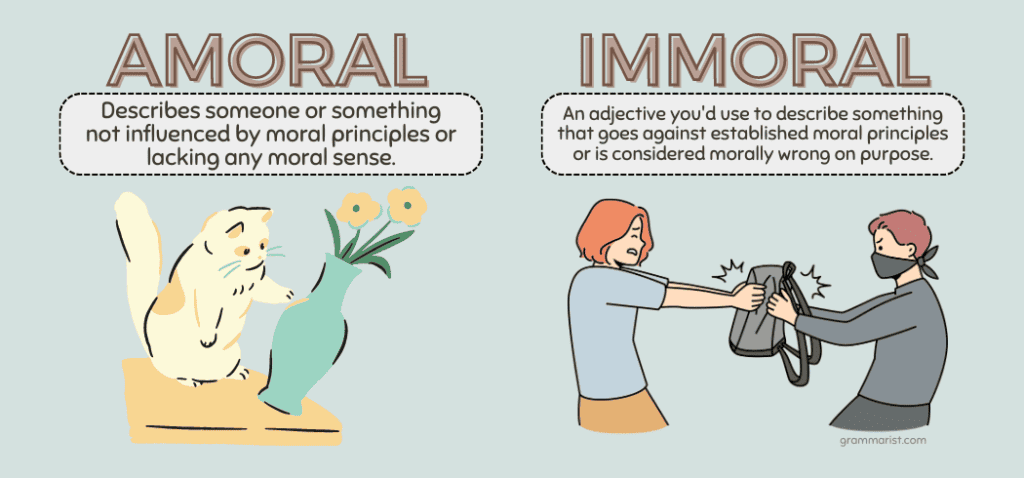The line between amoral vs. immoral is pretty thin, but there is a slight difference, I promise. When it comes to words in English that sound the same and have similar definitions, it can get fuzzy on how you’re supposed to use them. So, I’ll explain the difference and give you some tips on how to remember when and where to use each term.
What Is the Difference Between Immoral and Amoral?

They look and sound alike and hold similar meanings. The main difference between the terms “immoral” and “amoral” is all in their moral implications.
“Immoral” is the adjective you’d use to describe something that goes against established moral principles or is considered morally wrong on purpose.
But the word “amoral” is meant to describe someone or something not influenced by moral principles or lacking any moral sense. A good example is a cat and how it knocks things off surfaces. Yes, they’re doing it on purpose, but they don’t understand the right and wrong of it.
Amorality vs. Immorality
So, immoral and amoral are what you’d call individuals displaying respective behaviors. But you’d use amorality or immorality when describing the behaviors themselves. Both terms deal with morality, but they address different aspects of it.
- He is immoral (or amoral) because of his behavior.
- His behavior shows immorality (or amorality).
The Trick to Remember the Difference
Here’s my helpful trick to remember the difference between “amoral” and “immoral.” Just focus on the prefixes.
The prefix “a-” in “amoral” means “without” or “lacking,” showing the absence of moral principles.
But the prefix “im-” in “immoral” means “not” or “opposite of,” which usually shows something that purposely goes against moral principles. It’s not a foolproof trick, but that’s what I do to keep them straight.
What Are the Synonyms of Amoral?
- Unprincipled
- Nonmoral
- Dishonorable
- Unethical
- Naively immoral
Amoral Examples in a Sentence
- The scientist’s amoral approach to research led to several ethical concerns from the rest of the team, but he didn’t seem to understand the issues.
- Cats are the most amoral creatures on the planet, and we love them anyway.
- The character’s amoral behavior makes it difficult for the audience to sympathize with him.
- Nature is often considered amoral because it doesn’t operate within the realm of human morality.
Immoral Examples in a Sentence

- Most politicians display immoral behavior, often leading to distrust from their constituents.
- Stealing from the poor is a horrible immoral act, and you should never do it.
- The fitness brand’s immoral practices with supplements and drugs eventually led to a public scandal.
- Max was criticized for his immoral behavior during the school event, which went against the parent’s values.
It’s All in the Intent
The way I look at immoral and amoral is the intent. Did the person understand the difference between right and wrong but chose the wrong approach anyway? Then they’re immoral. Are they doing something you deem as bad, but they don’t understand that it’s bad? Then they’re amoral. It’s as simple as that!

Comments are closed.